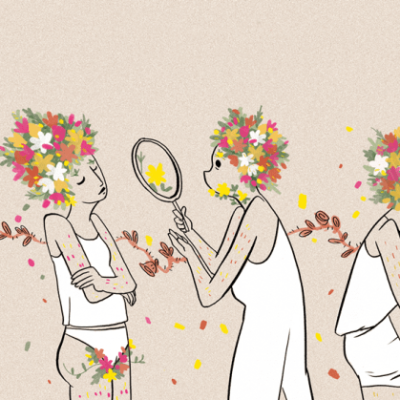Categories
My body presented to me the first paradox in my feminism that I would encounter. How could I claim to be a feminist if I was not proud of the body I was born in? My advocacy as a sixth grader seemed to fail when it came to my own self.
Every part of life, the world too, is storied. Stories are the thread that hold histories and truths together. Stories are at the core of myth-making. Everything that we know is part of multiple crisscrossing relational storylines that we raise and those that we have no power in raising.
In this write up, we’d like to share a sense of what emerges from a compilation of these responses. This is based on the thoughts and feelings that come through for those of us here at In Plainspeak who have had the joy of reading the original responses as they came in to us. (Some of the quotations that follow have been slightly edited for flow and to help connect themes.) We know that most things in the realm of art, information and ideas lend themselves to a wide range of inferences and insights depending on the individuals making the inferences.
Nathicharami takes sexuality and sexual desire away from upper-class, Gucci-clad women and makes its viewers acknowledge its existence in the lives of women (middle-class wives and widows, in the case of this film) who are invisibilised, both in the society they live in and as subjects of popular content.
Marriage also feels complicated when one approaches it through the lens of feminism. Marriage throws in two people and often their families into a system designed to perpetuate patriarchy, subjugate women, and bind men and women (in heteronormative marriage) into strict roles in the marriage.
I am still coming to terms with my own femininity, as with new learnings I find myself regaining many facets of my personality which were lost while trying to ‘act like a man’ and ‘act tough’.
During an orientation session of Queer Hifazat, a programme for queer youth run by my organisation Red Dot Foundation, Deepak*…
Scribbles: an Escape From the Mundane is a product of my thoughts and emotions when I was struggling to understand my sexuality and grappling with the idea of identifying with the spectrum of gender and sexuality outside the binary, but not being able to put a label on it.
Taboos in relation to female desire, sexuality and the body are often addressed in my work. My recent artistic interest focuses on rituals that are primarily centred on agricultural communities in Bengal that involve the veneration of fertility symbols and celebration of feminine sexuality.
What can celebrating sexuality look like? Un Sacré Mariage!, an animated short by Francis Papillon and Gregory Verreault shows us with aplomb, jest and buoyancy that one of the ways to do it could be by moving away from conventions and rituals.
If we are to reimagine coupledom and sexuality, we need to expand and challenge our ideas about togetherness, romance, love, intimacy, desire, sex, attachment, and so on.
Coupledom may or may not be for everyone, and does not mean the same thing to everyone. Importantly, coupledom does not hold the same value or position in our lives, even in the lives of the individuals perceived to be parts of a couple structure.
Practicing polyamory comes with the struggle of breaking down value systems and non-acceptance that may lead to ostracism not only from the heterosexual world but also from the queer and trans community. Claiming oneself as queer depends not only on how one identifies, but also, in society’s eyes, on who one’s partner is; being single does not qualify and neither does being polyamorous as the latter is considered ‘non-serious’.
Contemporary and predominant imaginations of intimacy focus primarily on a sex-centric (romance-centric?) model which assumes that sexual desire exists and holds the same value for every person and every relationship regardless of their subjective positions. Sexual intent and desire are often the cruces of how relational aspects such as intimacy are socially constructed.
Both rejections and affirmations of the couple are skewered on this doubleness: It is the fullest expression of love and proximity available to us, and it bears all the insufficiencies of present social relations. Monogamous romantic commitment, like infallible lifelong attraction to only men or only women, is surely a minority tendency expediently elevated to a general social principle.















